Module 1 Small Talk Grammar 情态动词课件(49张PPT)
文档属性
| 名称 | Module 1 Small Talk Grammar 情态动词课件(49张PPT) |  | |
| 格式 | zip | ||
| 文件大小 | 466.7KB | ||
| 资源类型 | 教案 | ||
| 版本资源 | 外研版 | ||
| 科目 | 英语 | ||
| 更新时间 | 2018-12-23 20:09:32 | ||
图片预览


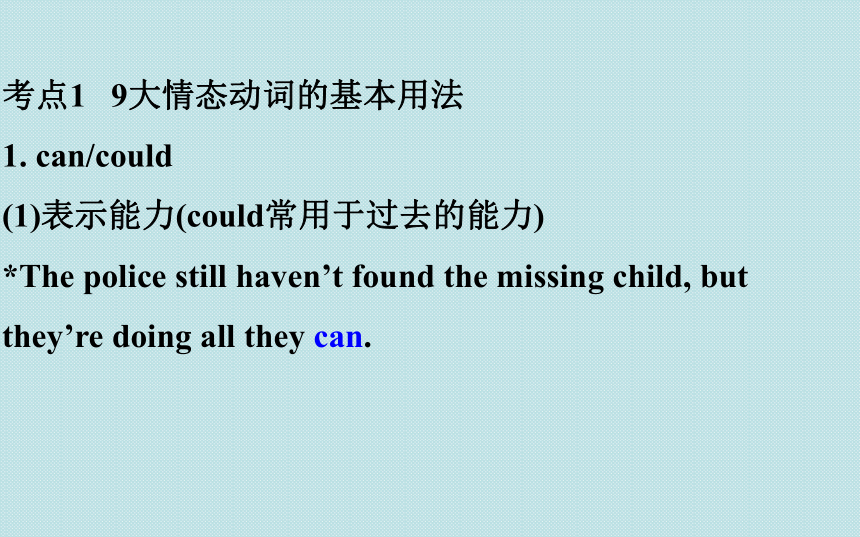
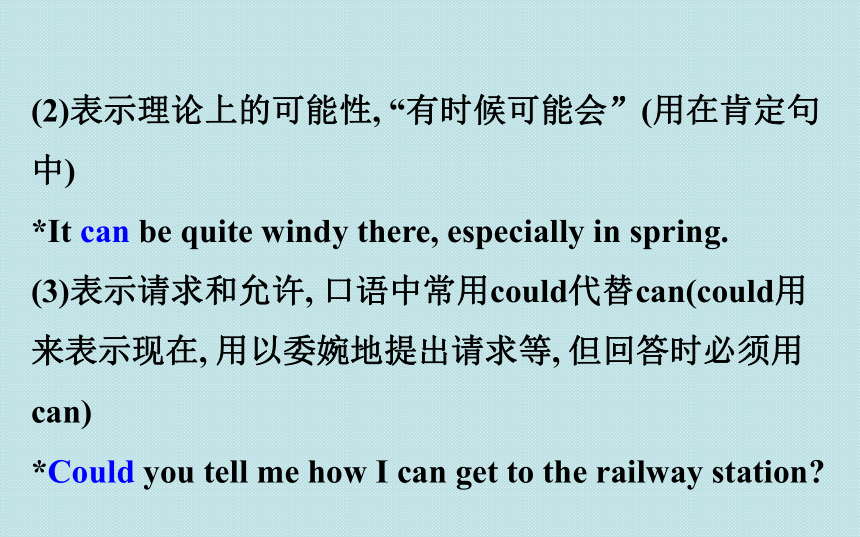

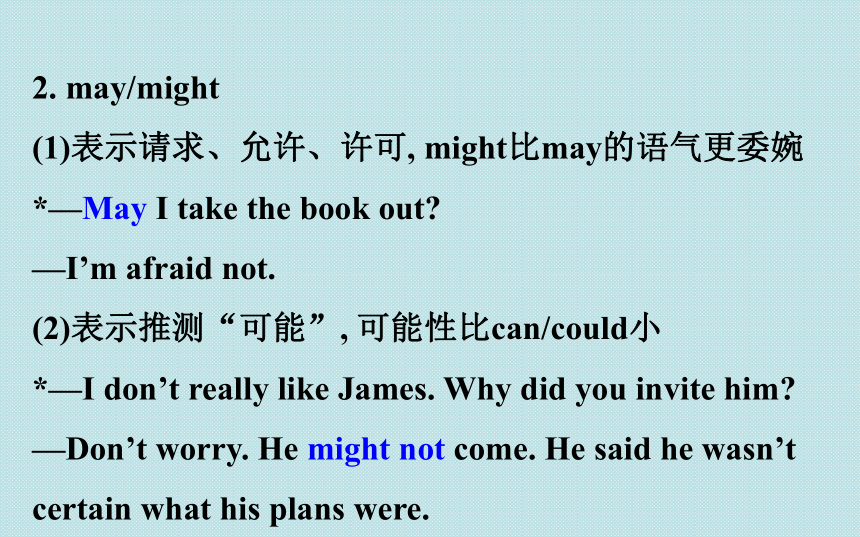

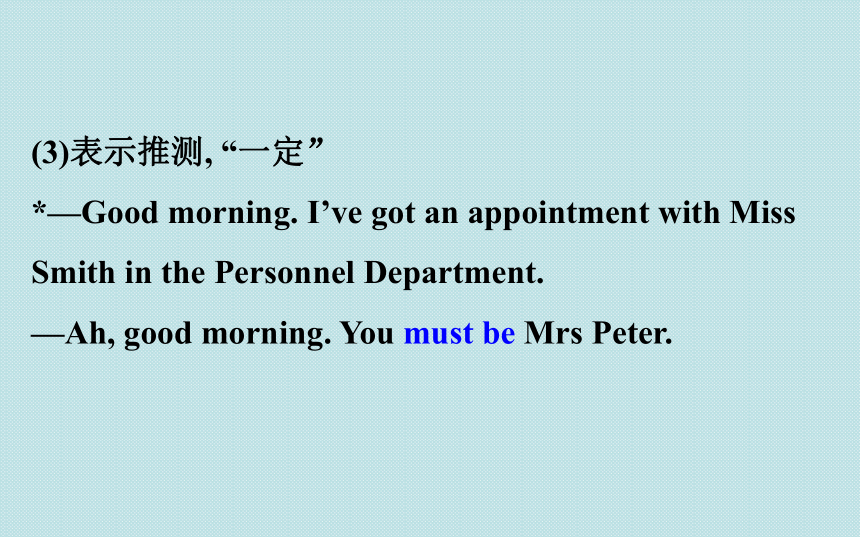


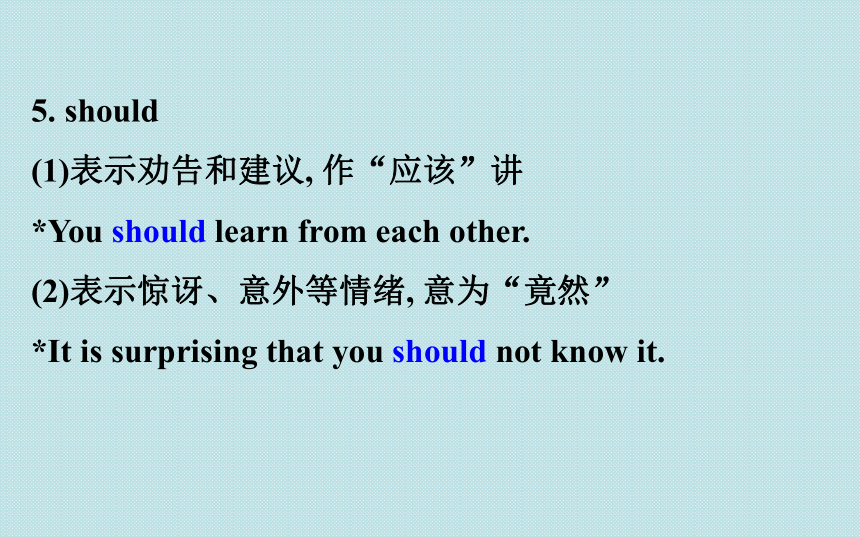

文档简介
课件49张PPT。情态动词一、情态动词
情态动词 本身有一定的词义,表示语气的单词。但是不能独立作谓语,只能和动词原形一起构成谓语。情态动词用在行为动词前,表示说话人对这一动作或状态的看法或主观设想。主要有下列:must, can (could), may (might), need, ought to, dare (dared), shall (should), will (would) ,must not.
考点1 9大情态动词的基本用法
1. can/could
(1)表示能力(could常用于过去的能力)
*The police still haven’t found the missing child, but they’re doing all they can. 考点1 9大情态动词的基本用法
1. can/could
(1)表示能力(could常用于过去的能力)
*The police still haven’t found the missing child, but they’re doing all they can. (2)表示理论上的可能性, “有时候可能会”(用在肯定句中)
*It can be quite windy there, especially in spring.
(3)表示请求和允许, 口语中常用could代替can(could用来表示现在, 用以委婉地提出请求等, 但回答时必须用can)
*Could you tell me how I can get to the railway station? (4)表示推测“可能”(用于否定句、疑问句中)
*Just be patient. You can’t expect the world to change so soon. 2. may/might
(1)表示请求、允许、许可, might比may的语气更委婉
*—May I take the book out?
—I’m afraid not.
(2)表示推测“可能”, 可能性比can/could小
*—I don’t really like James. Why did you invite him?
—Don’t worry. He might not come. He said he wasn’t certain what his plans were. 3. must
(1)表示“必须; 应该”
*—Shall I inform him of the change of the schedule right now?
—I am afraid you must, in case he comes late for the meeting.
(2)表示“偏要, 硬要”做某事
*If you must go, at least wait until the storm is over. (3)表示推测, “一定”
*—Good morning. I’ve got an appointment with Miss Smith in the Personnel Department.
—Ah, good morning. You must be Mrs Peter. 4. shall
(1)用于第一、三人称的疑问句中, 表示征求对方的意见
*Shall we go to the theatre by bus?
(2)用于第二、三人称的陈述句, 表示说话人给对方的命令、警告、允诺或威胁; 此外, 表示法律、条文中规定必须……时也用shall*—Will you read me a story, Mummy?
—OK. You shall have one if you go to bed as soon as possible. 5. should
(1)表示劝告和建议, 作“应该”讲
*You should learn from each other.
(2)表示惊讶、意外等情绪, 意为“竟然”
*It is surprising that you should not know it. (3)用在if条件句中, 表示可能性很小, 但也不是完全不可能
*If you should fail to come, ask Mr Smith to work in your place. 6. will/would
(1)用于表示意志或意愿
*—Why didn’t you come to Simon’s party last night?
—I wanted to, but my mom simply would not let me out so late at night.
(2)表示“请求; 建议”。用would比will委婉、客气些
*Will/Would you please keep the door open? (3)表示习惯, will可以表示现在的习惯, 意为“总是; 习惯于”。表示过去的习惯性动作用would
*He would get up early when he lived in the country.
(4)表示事物的某种性质和倾向, 或按规律“注定会”
*Oil will float on water. 7. need
作为情态动词表示“需要; 必要”, 用于否定句、疑问句和条件从句中
*I needn’t worry about my weekend—I always have my plans ready before it comes. need 也可用作实义动词,后面可以接动名词主动 形式,表示被动意义;
need doing sth
need to be done还可以用作名词,意为“需要 ”。?
There’s no need for you to stay.你不需要待在这儿了。
need的用法口诀
实义动词表“需要”,后跟名、代、不定式。
need后跟动名词,主动形式被动意。
情态动词表“需要”,没有时态人称数。
其后直接跟动原,常用疑问、否定句。8. dare
表示“敢; 敢于”, 主要用于疑问句、否定句和条件从句中, 一般不用于肯定句。I dare say是习惯说法, 意为“我想, 大概”
*I daren’t catch the mouse. 9. ought to
表示义务, 意为“应当”, 语气比should强, 表示不十分肯定或含蓄的推测, 意为“应是, 应该”
*You ought to work harder than before.
3组易混词(组)用法比较单句改错
(2016·全国卷Ⅱ)We can chose between staying at home and taking a trip.
解题关键: 情态动词can后要接动词原形。
答案判定: chose改为choose【高考题组】单句改错/单句语法填空
1. (2014·全国卷Ⅱ)We can lie on the grass for a rest, or sat by the lake listening to music. (改错)
_________
2. (2016·北京高考)I love the weekend, because I
_______ get up early on Saturdays and Sundays.
3. (2014·全国卷Ⅰ)You may ____ (find) that your child is attracted by one more than another. sat改为sitneedn’tfind考点2 5大表示推测的情态动词用法比较情态动词must,may,need引导的一般疑问句,如何做肯定与否定回答?
1. Must I do ....?
Yes, you must.
No, you needn't. or No, you don't have to
2.May I ....?
Yes, you may(can)
No, you mustn't(may not)
3. Need I ...?
Yes, you must
No,you needn't.二、虚拟语气
考点1状语从句中虚拟语气的用法
1. 非真实条件句中虚拟语气的用法2. 目的状语从句中虚拟语气的用法
for fear that/in case+从句: 从句谓语用should+动词原形, 意为“以防, 万一”。
*We got up early for fear that we should miss the early bus. 3. 方式状语从句中虚拟语气的用法
as if/as though+从句: (1)与现在事实相反, 从句用一般过去时; (2)与过去事实相反, 从句用过去完成时; (3)与将来事实相反, 从句谓语用would/could/might+动词原形。
*She speaks English as if/as though she were a native of New York. 4. 一些特殊结构的虚拟语气
(1)在条件句中的省略: 如果虚拟条件句中含有were, should, had三个词, 可将if省略, 把这三个词前置于主语之前, 形成部分倒装。
*Were I in your position, I would do the same. (2)错综时间虚拟句: 当条件状语从句所表示的行为和主句表示的行为所发生的时间不一致时, 这种虚拟条件句称为错综时间虚拟句。动词的形式要根据它所表示的时间做出相应的调整。
*If you had taken the doctor’s advice, you would be better now. (3)含蓄虚拟条件句: 有时假设的情况并不以条件句表示出来, 而是暗含在上下文中, 如通过介词(短语)with, without, but for等来表示。
*We would have put John’s name on the race list yesterday but for his recent injury. 考点2 其他从句中虚拟语气的用法
1. 主语从句中的虚拟语气
It is desired/suggested/proposed/necessary/important /strange/natural/essential/a pity+that从句, 从句中的谓语动词用“(should+)动词原形”。
*It’s strange that she (should) make so much trouble. 2. 宾语从句中的虚拟语气
(1)表示“建议, 命令, 要求”等意义时, 宾语从句用“(should+)动词原形”。①坚持: 动词insist; ②命令: order, command; ③建议: 动词advise, suggest, propose, recommend; ④要求: 动词request, require, demand, ask。
*Teachers recommend parents not allow their children under 12 to ride bicycles to school for safety. 【点津】①suggest意为“表明, 暗示”时, 宾语从句不用虚拟语气;
②insist意为“坚持说”时, 宾语从句不用虚拟语气。(2)I wish(that)+宾语从句(虚拟语气)。
①表示愿望与“现在事实相反”, 从句用一般过去时;
*How he wishes that he were a bird!
②表示愿望与“过去事实相反”, 从句用过去完成时;
*We wish that we had visited the Great Wall last year.
③表示将来愿望实现的可能性很小, 从句常用could/would +动词原形。
*We wish we would live on the moon one day. (3)would rather/prefer+ that从句(从句用虚拟语气)
①表示愿望与“现在事实或将来事实相反”, 从句用一般过去时。
*I would rather you were not here with me now.
②表示愿望与“过去事实相反”, 从句用过去完成时。
*I would rather you hadn’t done that. 3. 表语从句和同位语从句中的虚拟语气
(1)在suggestion, proposal, order, plan, idea, request, advice等名词后的表语从句和同位语从句中要用虚拟语气。其构成是“(should+)动词原形”。
*He gave orders that the guests (should) be hospitably entertained. (2)as if, as though引导的表语从句常用虚拟语气, 与现在事实相反用一般过去时; 与过去事实相反用过去完成时。
*It looks as if he were 10 years younger today.
*It looks as if he hadn’t had a meal for a week. 4. 定语从句中的虚拟语气
It’s (about/high/very) time+that从句(从句用虚拟语气, 谓语动词用一般过去时或should+动词原形, should不能省略), 意为“某人该做某事了”。
*It’s time that we should go/went home.
5. if only从句中的虚拟语气【点津】if only引导的感叹句, 其虚拟语气的结构与wish后接宾语从句中的虚拟语气的结构相同。
*If only the driver hadn’t driven so fast then! 【典例剖析】改错
(2016·全国卷Ⅱ)Some classmates suggest we can go to places of interest nearby.
解题关键: suggest表示“建议”, 后面接宾语从句时, 从句中谓语用should+动词原形或把should省略。
答案判定: can改为should或去掉can【高考题组】用所给词的适当形式填空
1. (2016·北京高考)Why didn’t you tell me about your
trouble last week? If you ________(tell) me, I could
have helped.
2. (2016·天津高考)I was wearing a seatbelt. If I hadn’t
been wearing one, I ______________________(injure). had toldwould have been injured
情态动词 本身有一定的词义,表示语气的单词。但是不能独立作谓语,只能和动词原形一起构成谓语。情态动词用在行为动词前,表示说话人对这一动作或状态的看法或主观设想。主要有下列:must, can (could), may (might), need, ought to, dare (dared), shall (should), will (would) ,must not.
考点1 9大情态动词的基本用法
1. can/could
(1)表示能力(could常用于过去的能力)
*The police still haven’t found the missing child, but they’re doing all they can. 考点1 9大情态动词的基本用法
1. can/could
(1)表示能力(could常用于过去的能力)
*The police still haven’t found the missing child, but they’re doing all they can. (2)表示理论上的可能性, “有时候可能会”(用在肯定句中)
*It can be quite windy there, especially in spring.
(3)表示请求和允许, 口语中常用could代替can(could用来表示现在, 用以委婉地提出请求等, 但回答时必须用can)
*Could you tell me how I can get to the railway station? (4)表示推测“可能”(用于否定句、疑问句中)
*Just be patient. You can’t expect the world to change so soon. 2. may/might
(1)表示请求、允许、许可, might比may的语气更委婉
*—May I take the book out?
—I’m afraid not.
(2)表示推测“可能”, 可能性比can/could小
*—I don’t really like James. Why did you invite him?
—Don’t worry. He might not come. He said he wasn’t certain what his plans were. 3. must
(1)表示“必须; 应该”
*—Shall I inform him of the change of the schedule right now?
—I am afraid you must, in case he comes late for the meeting.
(2)表示“偏要, 硬要”做某事
*If you must go, at least wait until the storm is over. (3)表示推测, “一定”
*—Good morning. I’ve got an appointment with Miss Smith in the Personnel Department.
—Ah, good morning. You must be Mrs Peter. 4. shall
(1)用于第一、三人称的疑问句中, 表示征求对方的意见
*Shall we go to the theatre by bus?
(2)用于第二、三人称的陈述句, 表示说话人给对方的命令、警告、允诺或威胁; 此外, 表示法律、条文中规定必须……时也用shall*—Will you read me a story, Mummy?
—OK. You shall have one if you go to bed as soon as possible. 5. should
(1)表示劝告和建议, 作“应该”讲
*You should learn from each other.
(2)表示惊讶、意外等情绪, 意为“竟然”
*It is surprising that you should not know it. (3)用在if条件句中, 表示可能性很小, 但也不是完全不可能
*If you should fail to come, ask Mr Smith to work in your place. 6. will/would
(1)用于表示意志或意愿
*—Why didn’t you come to Simon’s party last night?
—I wanted to, but my mom simply would not let me out so late at night.
(2)表示“请求; 建议”。用would比will委婉、客气些
*Will/Would you please keep the door open? (3)表示习惯, will可以表示现在的习惯, 意为“总是; 习惯于”。表示过去的习惯性动作用would
*He would get up early when he lived in the country.
(4)表示事物的某种性质和倾向, 或按规律“注定会”
*Oil will float on water. 7. need
作为情态动词表示“需要; 必要”, 用于否定句、疑问句和条件从句中
*I needn’t worry about my weekend—I always have my plans ready before it comes. need 也可用作实义动词,后面可以接动名词主动 形式,表示被动意义;
need doing sth
need to be done还可以用作名词,意为“需要 ”。?
There’s no need for you to stay.你不需要待在这儿了。
need的用法口诀
实义动词表“需要”,后跟名、代、不定式。
need后跟动名词,主动形式被动意。
情态动词表“需要”,没有时态人称数。
其后直接跟动原,常用疑问、否定句。8. dare
表示“敢; 敢于”, 主要用于疑问句、否定句和条件从句中, 一般不用于肯定句。I dare say是习惯说法, 意为“我想, 大概”
*I daren’t catch the mouse. 9. ought to
表示义务, 意为“应当”, 语气比should强, 表示不十分肯定或含蓄的推测, 意为“应是, 应该”
*You ought to work harder than before.
3组易混词(组)用法比较单句改错
(2016·全国卷Ⅱ)We can chose between staying at home and taking a trip.
解题关键: 情态动词can后要接动词原形。
答案判定: chose改为choose【高考题组】单句改错/单句语法填空
1. (2014·全国卷Ⅱ)We can lie on the grass for a rest, or sat by the lake listening to music. (改错)
_________
2. (2016·北京高考)I love the weekend, because I
_______ get up early on Saturdays and Sundays.
3. (2014·全国卷Ⅰ)You may ____ (find) that your child is attracted by one more than another. sat改为sitneedn’tfind考点2 5大表示推测的情态动词用法比较情态动词must,may,need引导的一般疑问句,如何做肯定与否定回答?
1. Must I do ....?
Yes, you must.
No, you needn't. or No, you don't have to
2.May I ....?
Yes, you may(can)
No, you mustn't(may not)
3. Need I ...?
Yes, you must
No,you needn't.二、虚拟语气
考点1状语从句中虚拟语气的用法
1. 非真实条件句中虚拟语气的用法2. 目的状语从句中虚拟语气的用法
for fear that/in case+从句: 从句谓语用should+动词原形, 意为“以防, 万一”。
*We got up early for fear that we should miss the early bus. 3. 方式状语从句中虚拟语气的用法
as if/as though+从句: (1)与现在事实相反, 从句用一般过去时; (2)与过去事实相反, 从句用过去完成时; (3)与将来事实相反, 从句谓语用would/could/might+动词原形。
*She speaks English as if/as though she were a native of New York. 4. 一些特殊结构的虚拟语气
(1)在条件句中的省略: 如果虚拟条件句中含有were, should, had三个词, 可将if省略, 把这三个词前置于主语之前, 形成部分倒装。
*Were I in your position, I would do the same. (2)错综时间虚拟句: 当条件状语从句所表示的行为和主句表示的行为所发生的时间不一致时, 这种虚拟条件句称为错综时间虚拟句。动词的形式要根据它所表示的时间做出相应的调整。
*If you had taken the doctor’s advice, you would be better now. (3)含蓄虚拟条件句: 有时假设的情况并不以条件句表示出来, 而是暗含在上下文中, 如通过介词(短语)with, without, but for等来表示。
*We would have put John’s name on the race list yesterday but for his recent injury. 考点2 其他从句中虚拟语气的用法
1. 主语从句中的虚拟语气
It is desired/suggested/proposed/necessary/important /strange/natural/essential/a pity+that从句, 从句中的谓语动词用“(should+)动词原形”。
*It’s strange that she (should) make so much trouble. 2. 宾语从句中的虚拟语气
(1)表示“建议, 命令, 要求”等意义时, 宾语从句用“(should+)动词原形”。①坚持: 动词insist; ②命令: order, command; ③建议: 动词advise, suggest, propose, recommend; ④要求: 动词request, require, demand, ask。
*Teachers recommend parents not allow their children under 12 to ride bicycles to school for safety. 【点津】①suggest意为“表明, 暗示”时, 宾语从句不用虚拟语气;
②insist意为“坚持说”时, 宾语从句不用虚拟语气。(2)I wish(that)+宾语从句(虚拟语气)。
①表示愿望与“现在事实相反”, 从句用一般过去时;
*How he wishes that he were a bird!
②表示愿望与“过去事实相反”, 从句用过去完成时;
*We wish that we had visited the Great Wall last year.
③表示将来愿望实现的可能性很小, 从句常用could/would +动词原形。
*We wish we would live on the moon one day. (3)would rather/prefer+ that从句(从句用虚拟语气)
①表示愿望与“现在事实或将来事实相反”, 从句用一般过去时。
*I would rather you were not here with me now.
②表示愿望与“过去事实相反”, 从句用过去完成时。
*I would rather you hadn’t done that. 3. 表语从句和同位语从句中的虚拟语气
(1)在suggestion, proposal, order, plan, idea, request, advice等名词后的表语从句和同位语从句中要用虚拟语气。其构成是“(should+)动词原形”。
*He gave orders that the guests (should) be hospitably entertained. (2)as if, as though引导的表语从句常用虚拟语气, 与现在事实相反用一般过去时; 与过去事实相反用过去完成时。
*It looks as if he were 10 years younger today.
*It looks as if he hadn’t had a meal for a week. 4. 定语从句中的虚拟语气
It’s (about/high/very) time+that从句(从句用虚拟语气, 谓语动词用一般过去时或should+动词原形, should不能省略), 意为“某人该做某事了”。
*It’s time that we should go/went home.
5. if only从句中的虚拟语气【点津】if only引导的感叹句, 其虚拟语气的结构与wish后接宾语从句中的虚拟语气的结构相同。
*If only the driver hadn’t driven so fast then! 【典例剖析】改错
(2016·全国卷Ⅱ)Some classmates suggest we can go to places of interest nearby.
解题关键: suggest表示“建议”, 后面接宾语从句时, 从句中谓语用should+动词原形或把should省略。
答案判定: can改为should或去掉can【高考题组】用所给词的适当形式填空
1. (2016·北京高考)Why didn’t you tell me about your
trouble last week? If you ________(tell) me, I could
have helped.
2. (2016·天津高考)I was wearing a seatbelt. If I hadn’t
been wearing one, I ______________________(injure). had toldwould have been injured
